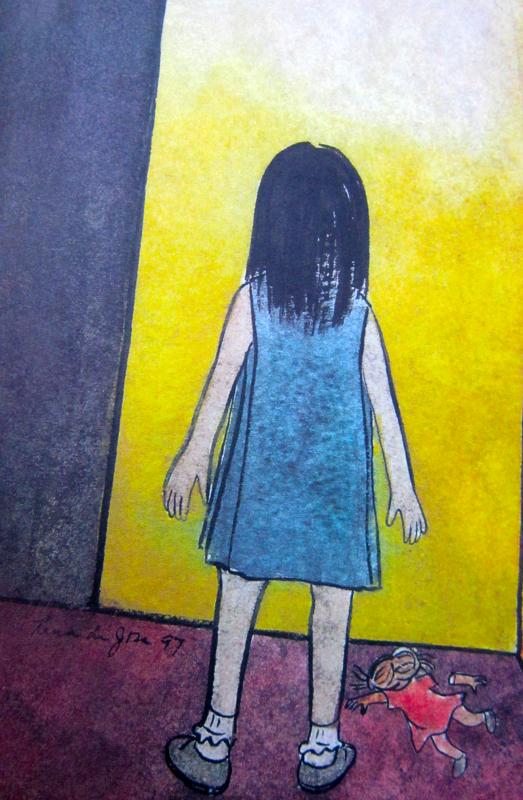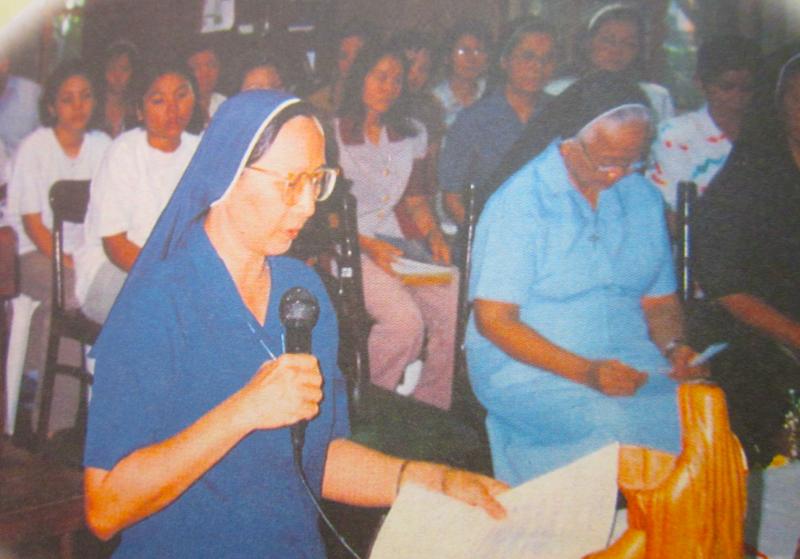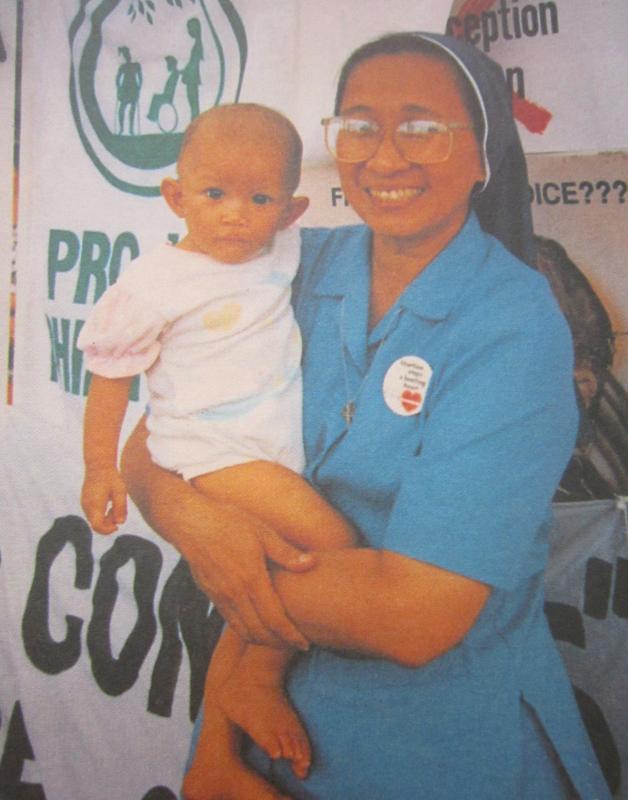The Angels Weep
By Sr. Pilar Verzosa, RGS
Jesus said, “Their angels see the grace of God” to emphasize the sacredness of children. However, these angels weep when they see the horrors of child abuse so common today. Maybe it was happening all along and we just didn’t know about it. Sr. Pilar Verzosa of the Good Shepherd Sisters tells us how Welcome House and the RGS Sisters are trying to help.

The phone rang at 9:00 pm. A small quivering voice asked, “Is this K-Love Radio?” “No” I said, “This is Welcome House.” The female voice spoke again, “I was listening to the radio and the announcer said I can call this number if I needed help.” Yes, we are here to help. You seem to have a problem. Do you want to tell me about it? I am Sr. Pilar. I’m a Good Shepherd sister and I am a nurse.” The connection was made.
The girl on the phone whispered, “I’m afraid. I don’t know what to do. I don’t think he will come tonight. I keep praying he will never come home anymore."
“He? Who is he?’ I asked.
“My stepfather,” she answered. And, with a little more prodding from me, she began to tell me more about herself, revealing her harrowing experience of sexual abuse from her stepfather. With more prodding, she revealed her age and her name.
One other time, the phone rang at 11pm. It was a social worker of channel 2’s Bantay Bata asking if she could bring Dada, a nine-year-old girl who was referred by a neighbor. Dada refused to go back to her house because her mother beat her up every time she failed to earn enough from sellingsampaguita on the streets.
One other day, the guidance counselor of a Catholic school referred to us Sheila, a grade six student who used to be in the honor roll but now suffered failing grades. She says her father throws things around the house and sometimes hits her whenever he is drunk. Her mother is abroad and she had to do all the household chores as well as take care of her younger siblings.
Against Human Dignity
Many think that child abuse means only sexually molestation. But the term also includes psychological and physical neglect, cruelty, deeds and works which demean the intrinsic worth and dignity of the child as a human being. Republic Act 7610 also considers as punishable unreasonable deprivation of the child’s basic needs or failure to immediately give medical treatment resulting in serious impairment of his or her growth and development or even death.

Sr. Pilar leading the prayer during the blessing of Welcome House
Liza’s Story
The trauma could be so deep-seated that some children deny the incidents ever happened. They could go through years of denial until recall is triggered of by a similar trauma. The story of Liza demonstrates what denial of child abuse could do the psyche of the person. This is her story:
I was pregnant with my fourth child and I needed help. I was 32 years old, a mother of three children, separated from my husband, but how was I going to explain to my children that the baby I was carrying was not my husband’s? How would I explain to my colleagues that a successful psychiatrist like myself was in crisis?
The thought of abortion crossed my mind; but being a doctor, I knew its consequences. The counselor at the Prolife Pregnancy Counselling suggested I opt for adoption. I thought that deciding for adoption was enough to solve my problem, but the counselor patiently led me on the delve into my past life. Her last question blew your mind. She asked me if I was molested as a child. My body began to quiver. For the first time in my life I realized that I had to confront the truth that I was sexually abused.
I was in grade school when my two uncles started molesting me. At first, I was confused and scared. I had no words to describe my feelings. I kept the secret. It happened again ... and again. There was nothing I could do to stop it. So I gave in ... and I began to enjoy what was happening as my uncles alternately used me. I isolated myself. I felt dirty like garbage. I became promiscuous and my children were sired by different men. I got married for convenience – so someone could be the father of my children. We separated within a couple of years. I was battered and lonely.
At this point I started seeing the father of my first child. I became pregnant and by the grace of God, in my desperation, I chanced upon the Pro-Life Ad in the PLDT Directory. It said: “Pregnant” Need Help? Call 526-8818.”
I dialed the number and I immediately received counseling. During the counseling session, I realized that I was caught, in a cycle of abuse. I was suffering from what the counselor called Post-Traumatic Syndrome Disorder. As a psychiatrist, I did not recognize it happening to me. I was making bad decisions because I had lost my worth as a person. It was in prayer that I understood God’s love and plan for me and that He will solve my problems if I “seek first His Kingdom and His righteousness.”
I understand how precious I am and how badly I had abused. I had abused my body because I had been abused. Those sessions helped me to resolve and to transform my past experiences into a learning experience. I looked forward to a new life completely surrendred to the Lord.
Last month, as I was preparing my family to accept my situation, I had a miscarriage, when I was finally looking forward to having a child with so much joy for the first time in my life, there was no baby to be born. The baby who saved me and allowed me to transform my life while he was a part of me for two months was gone. I cried and grieved for his loss -- a grief that I had not gone through when I lost my innocence as a child. I may not have seen the face of my baby but I felt God was telling me, “I have made your baby in My Image to bring you back to Me.”
Is Forgiveness Enough?
It takes time for some women to realize and remember some forms of violence. They may carry a sense of shame and guilt that makes them fearful that rejection and judgment will result if they reveal it. Christian teachings on forgiveness can increase the emotional pain of survivors unless it is made clear to them that forgiveness does not mean allowing things to go on as before. Since forgiveness is not a solitary action but a gesture of grace in relationships, the shape it takes often depends on the justice being enacted against the offender, and evidence of repentance on the part of the person who injured the woman, no matter how long ago it happened to her as a child.
Experience of violence damages the child’s sense of physical and spiritual integrity. Her body has been invaded against her will. She may have feelings of being unclean or needing to wash. She often feels worthless and used. She knows firsthand how fragile her person and her world is. The approach of healing must seek to restore the child’s (or the woman’s feelings of wholeness and control over her own person and life.
Violence is an encounter with the power of evil in the world. Such suffering is not random or abstract, but an experience of evil directed against her person. It threatens her trust in God and raises many faith questions: Was this somehow God’s will? Where was God when I was so in need? How could God love me and let me go through this? Is this suffering a punishment for the sinfulness in my life? What kind of world is this? Answering these questions on a personal level is part of healing. It means moving from feeling abandoned to a sense of God’s spirit with the victim.
Paths of Healing

Sr. Pilar with one of the children in Welcome House
Assisting the girls and women to walk the paths to healing demands commitment, availability, creativity and faith in a God who writes straight with crooked lines. I have had to rediscover new ways of reading biblical passages with them, to help them with cleansing and healing rituals, to bring them to prayer groups for healing of memories. Encouraging them to keep a journal of their prayers, helping them deal with their dreams, which very often were nightmares, taking them on nature walks, or enjoying poems, songs and cross-stitching or painting with them gives them a sense that they are worth spending time with. Some find the exercise difficult but I make them list down all the persons in their life who have been positive as well as negative influences. Then we go to prayer -- to praise, to thank, to forgive, to intercede for each one, yes, most especially for the abuser.
The journey to recovery from child abuse is a spiritual one. Sandra M Flaherty, a survivor of child abuse, in her book Woman, Why Do You Weep? describes recovery as a painful restructuring of one’s relationship with God. However, the other side of grief is joy and wholeness. Flaherty wrote, “It resembles the Paschal Mystery of Jesus – through suffering and death there is resurrection. Having made it to be the other side of dying and rising of recovery, I have come to believe that the fundamental call of Christianity and recovery is a call to hope. It is a call to hope in despair, to believe in life amidst death, to witness to the resurrection of Jesus while living in the tomb of our grief.”
Many Jennys, Sheilas, Lizas and Dadas have come to Welcome House and say they found the compassion of Jesus, the Good Shepherd, in the security and the safety of the shelter, the routine of the daily activities that begin and end in group prayers, the listening ear of the Sisters and the companionship of the other girls and women who suffer and rejoice with them.
I have been very privileged to be a part of their recovery, their journey to a new life of hope, determination and faith.